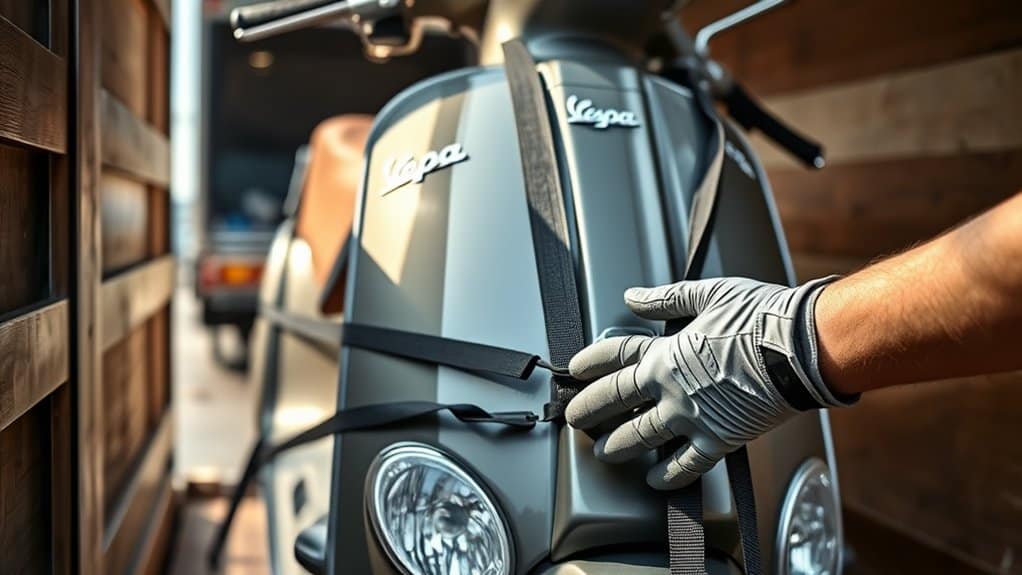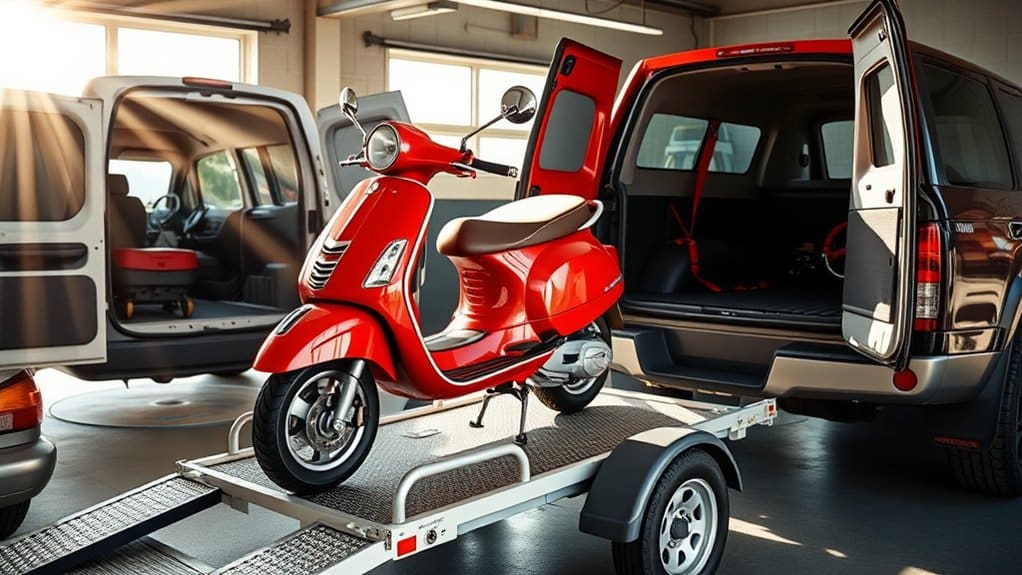What Exactly Is A Vespa?
Vespa is widely known as a successful brand of Italian manufactured scooters and mopeds, evolving from a single model motor scooter that was first made popular in the mid 1940s, and recognized by their painted and pressed steel body combining a cowl enclosure around the engine to conceal dirt and grease, as well as a flat floor panel designed to protect the feet of riders and passengers, and a forward fairing to protect from wind, rain, bugs, and other road debris.
Vespas continue to be popular and inexpensive transportation even today, especially in urban areas where automotive parking may be at a minimum, and older restored Vespas are popular on the automotive enthusiast circuit. They are popular across the United States and Canada, as well as Europe and Japan.

Can I Take My Vespa With Me When I Move?
Yes, Vespas are designed to be transportable, and this can be done easy with the proper planning and execution. If you are planning a move and want to take your Vespa with you, proper care should be taken to avoid any damage to the vehicle during the process.
What Is Involved In Transporting a Vespa?
The first step is to decide exactly how you wish to transport your Vespa. If the move is a relatively short distance, you may save time by simply driving it to its new home. Simple enough, problem solved. But if you are looking at moving from state to state or across the country, then you most likely have no time for such a road trip (no matter how much fun it might be!).
The good news is that Vespas will fit in nearly any type of transportation vehicle from a mini van to larger trucks. Pickup trucks will require an uncovered bed to accommodate the Vespa, while cargo vans are probably the single most convenient as they offer enclosure as well as more than adequate space.
Fully enclosed cargo trailers, ideally a 5’x8’ minimum, also offer reliable space and protection during these moves, and even open trailers can be uses as well. Just make sure you have the proper hitch installed and that your vehicle is rated for towing a trailer. Clearly, there are a number of options available for this job.
What Other Tools Or Materials Are Needed to Transport a Vespa?
You will also need a few additional materials to make sure the transport is a safe and efficient one:
- Secure some metal cam straps to tie down and secure the Vespa. Otherwise, the Vespa may shift during transport that can cause damage to the vehicle.
- You will also need a bar harness with rubber cups to secure and support the handlebars over the course of the trip. You want as little movement and shifting as possible.
- Wheel chocks are small wedges that are places under the wheels, again, ideally to prevent the Vespa from rolling forward or backward.
- A loading ramp is needed as the Vespa is too heavy to safely remove from a truck or cargo van. Most trailers will already have a loading ramp installed or at the very least one that can be quickly attached and unattached. Make sure the ramp is metal or at least metal enforced to support the weight of the Vespa. If there is no ramp available, see if you can secure access to a loading dock, which will allow you to back straight up and be fairly level with the surface where the Vespa is and can be loaded in directly with no obstructions.
- Finally, do not forget a tarp to place over the Vespa to protect it from any road debris or other hazards. Some folks insist on putting a tarp over their vehicle even if it is being transported in an enclosed trailer or van! It is all up to you.

How To Load and Secure a Vespa
Once you are ready, it is time to load the Vespa into your van or trailer. Have someone assist you during this part of the process. Resist the urge to drive the Vespa into or onto your trailer, as that can be dangerous and have results best described as “unfortunate.” Just wheel it up the ramp and into position, and do not forget to lower the kickstand when it is in position. Every little bit helps!
Next you should remove any accessories from the Vespa before securing it in place, as this will help avoid damage. Disconnect the power supply to avoid energy drainage, particularly if the Vespa is going to be stored for a while. Secure the handlebars using the bar harness, and then attach the bar harness to the cam straps. Cam straps should be fastened to the appropriate tow hitches located on either side of the van or trailer. These same hitches are also located in the railing of pickup truck beds.
Position the straps across the top of the Vespa, then tighten down as securely as possible with risking damage to the Vespa. You will have a pretty good idea when the bike is secured. Compress the suspension just enough that the bike does not easily move. The suspension will suffer no damage. If you are concerned about your Vespa’s paint and finish, have some old towels or t-shirts to place between the straps and the bike to avoid blemishes.
Finally, chock the wheels securely to prevent any forward or backward movement which may occur during transport. Now your Vespa is ready for the journey to its next destination.
How To Unload a Vespa At Your New Destination
Once you have arrived at your destination, it is time to unload the Vespa. Basically, you want to do everything in reverse. Remove the chocks from beneath the wheels. Then loosen and unhook the straps and the bar harness. When it is time to remove the Vespa from the cargo hold, secure some assistance from a friend or neighbor and have one person push the Vespa while the other helps support and guide the vehicle until it is off the trailer, down the ramp, and on firm ground. Trying to do it all yourself means you could very easily lose control of the Vespa and end up damaging it. Not exactly how you want to start this new chapter of your life!
In Conclusion
Moving your Vespa does not have to be a stressful endeavor. As with any project, large or small, proper planning prevents poor performance. Through judicious planning and careful execution, you should have no problem relocating your Vespa to your new home or office.


